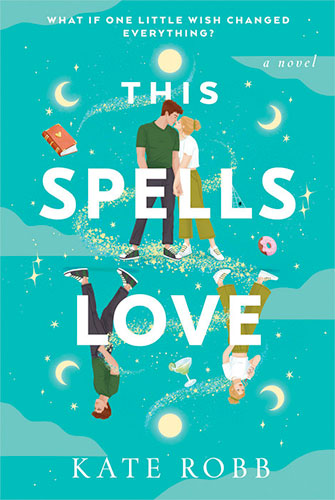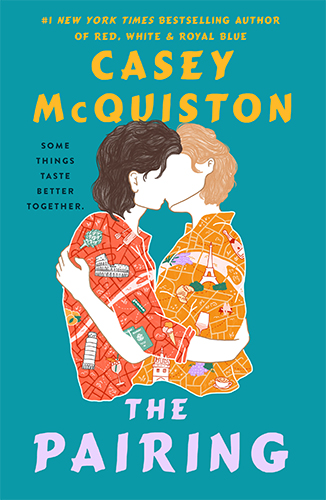What if one impulsive, margarita-fueled decision could wipe away your worst heartbreak—but at the cost of everything else? In This Spells Love, Kate Robb blends romantic comedy with a dash of magical realism to explore what happens when one woman’s attempt to forget her ex rewrites her entire reality. After a drunken spell with her best friend Dax, her sister, and her eccentric aunt, Gemma wakes up in a world where her ex never existed, her life is nearly unrecognizable, and the one person who’s always mattered most—Dax—no longer remembers her at all. Whimsical and heartfelt, this debut asks a compelling question: if you could undo the past, would you still choose the same future?

It’s like Hot Tub Time Machine without the hot tub.
Kate Robb, This Spells Love
There’s real charm in the setup, and the pacing is strong throughout. Robb’s prose is breezy and digestible, with writing that makes it easy to devour chapters without realizing how much time has passed. The magical realism element is understated, more a plot device than a full-on genre shift, which works well for readers who prefer grounded rom-coms. And at its core, the novel is about more than romantic love. It’s about learning to recognize your blind spots, appreciating the people who anchor you, and understanding that healing doesn’t come from rewriting the past. It comes from making peace with it.
But for all its strengths, This Spells Love stumbles where it matters most: character depth. Gemma, as a narrator, is often difficult to root for. Her self-absorption borders on grating, and while the story hinges on her personal growth, it’s hard to feel invested in that journey when she seems oblivious to the emotional needs of those around her. She treats her support system like background noise and rarely reflects on how her actions impact others until late in the book. While this is realistic in some ways, it doesn’t always make for compelling reading.
The side characters—particularly Gemma’s sister and aunt—feel one-dimensional. They appear when needed, serve their purpose, and then retreat until the plot calls for them again. Even Dax, who is arguably the emotional anchor of the novel, is frustratingly underdeveloped. Because the majority of their romance happens in an alternate reality where he’s essentially a different person, the emotional stakes never quite land. The book gestures at a best-friends-to-lovers arc, but it lacks the lived-in warmth and history that make those stories shine. There’s no satisfying build-up to the chemistry; we’re simply told it exists, and then expected to believe it transcends timelines.
The predictable path is boring. And you miss out on the chance to try some really incredible things.
Kate Robb, This Spells Love
That said, there’s something endearing about the concept itself. The idea that love can survive (thrive!) through a fractured reality is a powerful one. And while the execution is imperfect, the themes resonate. Gemma’s realization that Dax is her constant, the one person who feels like home no matter the version, lands with a quiet poignancy. It’s not quite the sweeping romance it could have been, but it’s earnest. And sometimes, that’s enough.
This Spells Love is a flawed but engaging debut. It may not deliver on all its witchy promises, and it might leave some readers wanting more from its characters and emotional arcs. Still, for an afternoon curled up with something light and slightly magical, it scratches the itch for cozy fall vibes. Just don’t expect potions, pentagrams, or a deeply fleshed-out love story. This one’s more about the lesson learned than the spell cast.
Thank you to NetGalley and Dial Press / Random House Publishing Group for sharing an advanced reader copy of this book in exchange for an honest review.

